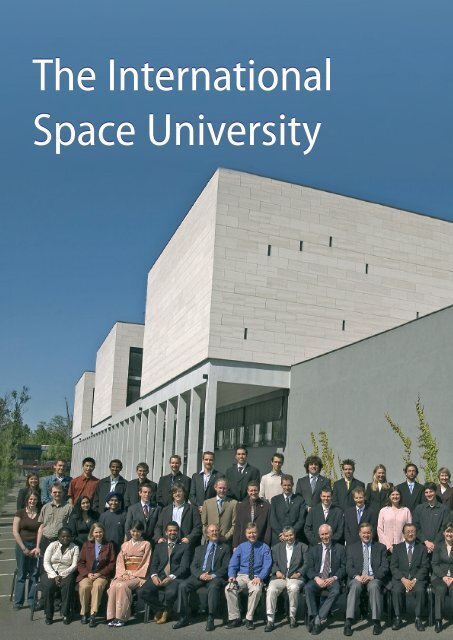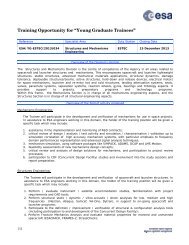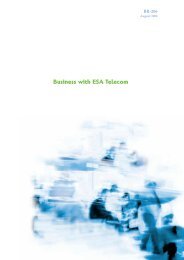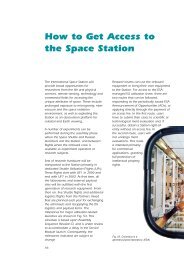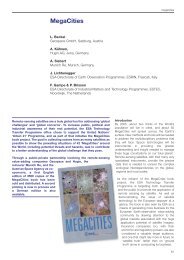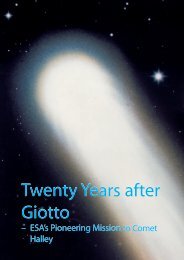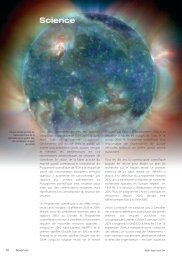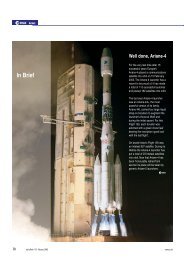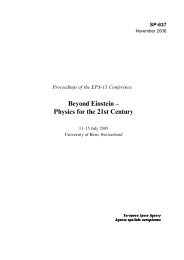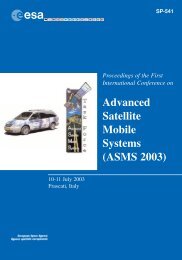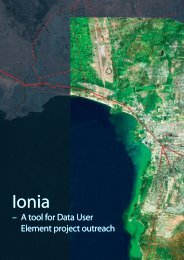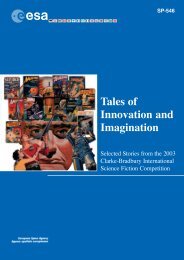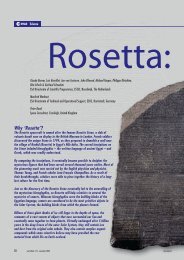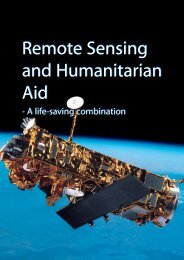The International Space University - ESA
The International Space University - ESA
The International Space University - ESA
You also want an ePaper? Increase the reach of your titles
YUMPU automatically turns print PDFs into web optimized ePapers that Google loves.
<strong>The</strong> <strong>International</strong><br />
<strong>Space</strong> <strong>University</strong>
ISU<br />
Roger Elaerts & Walter Peeters<br />
<strong>ESA</strong> Education Department, <strong>ESA</strong> Directorate for<br />
External Relations, <strong>ESA</strong> Headquarters, Paris,<br />
France<br />
T<br />
he <strong>International</strong> <strong>Space</strong> <strong>University</strong> (ISU)<br />
offers, with the support of the world space<br />
community and within an international and<br />
intercultural environment, interdisciplinary<br />
post-graduate programmes in space studies.<br />
<strong>The</strong>se graduate programmes prepare<br />
professionals from all sectors to meet the<br />
challenges of international space cooperation<br />
and the restructuring of the space sector.<br />
Although it was created as recently as 1987,<br />
the ISU is remarkably successful: by 2005 it<br />
had around 2400 alumni, forming a strong<br />
network in the space community.<br />
Introduction<br />
Whereas many universities in the world<br />
have excellent space departments, the<br />
<strong>International</strong> <strong>Space</strong> <strong>University</strong> (ISU) at its<br />
campus in Strasbourg (F) concentrates<br />
exclusively on the ‘space’ aspect in its<br />
curriculum. Another difference is that<br />
space is treated as interdisciplinary rather<br />
than as a specialised area by looking at all<br />
aspects related to space. Diversity is<br />
ensured by selecting students and faculty<br />
on the ‘3I principle’: international,<br />
intercultural and interdisciplinary. Indeed,<br />
a specific effort is made to ensure that<br />
groups are as international as possible,<br />
typically composed of more than 20<br />
nationalities.<br />
<strong>The</strong> intercultural character creates a<br />
microcosmos in which the participants,<br />
even if they are nationals of highly<br />
competitive (space) nations, work closely<br />
together. Another goal is to improve gender<br />
esa bulletin 126 - may 2006 35
Education<br />
<strong>The</strong> three founders of ISU. From left: Peter Diamandis, Todd<br />
Hawley and Bob Richards<br />
distribution in the future space world by<br />
aiming at 30% female participation, which<br />
is far superior to today’s gender<br />
distribution in the space sector.<br />
<strong>The</strong> interdisciplinary character is<br />
unique. It is reflected in the distribution of<br />
the participants, faculty and lectures over<br />
the different disciplines. All space-related<br />
36<br />
ISU Milestones<br />
1987 ISU Founding Conference<br />
and Incorporation in USA<br />
1988 First Summer Session at MIT<br />
in Cambridge, MA<br />
1993 Strasbourg selected to host<br />
ISU Central Campus<br />
1993 First Affiliate Conference,<br />
Huntsville, USA<br />
1994 ISU relocates to Strasbourg<br />
and Incorporates in Alsace<br />
1995 First Master in <strong>Space</strong> Studies<br />
(MSS) Program based in<br />
Strasbourg<br />
1996 First Short Programs<br />
(Symposium, Workshops and<br />
PDP)<br />
2000 Groundbreaking for Central<br />
Campus Building<br />
2002 Official Opening of Central<br />
Campus Building<br />
2003 First Introductory <strong>Space</strong><br />
Course (ISC) held in<br />
Strasbourg<br />
2004 Official Accreditation by<br />
French Ministry of<br />
Education<br />
2004 First Master of <strong>Space</strong><br />
Management (MSM)<br />
Program<br />
aspects are covered in each programme,<br />
ranging from science and engineering, life<br />
sciences and medicine, business and<br />
management, policy and law and even pure<br />
humanities topics such as philosophy and<br />
art. Students with backgrounds in any<br />
discipline may be accepted for the<br />
programme, on condition that they clearly<br />
demonstrate their interest in space<br />
activities to the admissions committee.<br />
<strong>The</strong> ISU Programmes<br />
<strong>The</strong> programmes offered by the ISU are<br />
dedicated to the career development of<br />
graduate students and professionals from<br />
all nations seeking advancement in spacerelated<br />
fields. Tailored to the needs of<br />
postgraduates and professionals in the<br />
space sector or those who wish to work<br />
there, ISU offers two kinds of<br />
programmes:<br />
Programmes delivered each year on a<br />
regular basis<br />
three graduate programmes: a 12-month<br />
Master in Science (MSc) of <strong>Space</strong><br />
Studies (MSS), a 12-month MSc of<br />
<strong>Space</strong> Management (MSM), and a<br />
2-month Summer Session Programme<br />
(SSP);<br />
an Introductory <strong>Space</strong> Course: a 1-week<br />
course providing a basic introduction<br />
to space topics;<br />
two annual conferences: the Alumni<br />
An ISU symposium room<br />
Conference (organised by the alumni)<br />
and the ISU Annual Symposium.<br />
Short programmes (1-day to 2-weeks)<br />
Delivered on demand and/or to respond to<br />
a specific need, these programmes include<br />
professional development programmes,<br />
workshops, short courses and forums.<br />
Participation in ISU programmes is open<br />
to individuals and institutions of all<br />
nationalities. <strong>The</strong>y are presented in more<br />
detail in the programme handbooks and at<br />
www.isunet.edu<br />
In order to meet the needs expressed by<br />
industry, the courses aim at giving each<br />
ISU student:<br />
– an understanding of the interactions<br />
between all the space-related disciplines,<br />
leading to a coherent view of space<br />
and related activities, understood as a<br />
complex system;<br />
– an appreciation of the global perspective<br />
and of the challenges presented by the<br />
international character of space<br />
activities and their applications,<br />
including the differences in method<br />
and logic underlying planning and<br />
decisions, largely influenced by cultural<br />
and disciplinary backgrounds.<br />
In addition, the active participation of<br />
the students is encouraged through handson<br />
exercises, in order to give them the<br />
ability:<br />
esa bulletin 126 - may 2006 www.esa.int
A hands-on workshop under way<br />
– to make appropriate decisions at the<br />
appropriate time, using critical thinking<br />
and foresight;<br />
– to understand the methods of working<br />
and of management in various countries;<br />
– to lead international teams and to<br />
manage international projects by taking<br />
account of the different cultural<br />
approaches, the political and legal<br />
implications and the budgetary and<br />
financial issues;<br />
– to communicate with the different<br />
partners and the public, while accommodating<br />
the industrial, governmental<br />
and academic perspectives.<br />
Master of Science Curriculum<br />
MSS and MSM are graduate-level degrees<br />
designed for individuals seeking<br />
professional development or further<br />
academic study. <strong>The</strong>y entail 12 months of<br />
highly intensive graduate study, including<br />
a 3-month professional internship and<br />
several trips of professional interest. <strong>The</strong><br />
main elements of the programmes are:<br />
– a balanced series of lectures covering<br />
all major disciplines related to space,<br />
with workshops and roundtables;<br />
– a series of lectures on contemporary<br />
space-related issues and events which<br />
as a whole provides an interdisciplinary<br />
and intercultural education;<br />
– Design Team Projects involving most,<br />
if not all, of those disciplines;<br />
– Individual Projects performed during<br />
the academic year and during an<br />
internship period;<br />
– professional visits and participation in<br />
the ISU Annual Symposium;<br />
– skill training.<br />
This broad programme is complemented<br />
by more detailed study in the area of the<br />
individual student’s main interest, via<br />
advanced lectures, specialised seminars,<br />
Individual Projects and a Student<br />
Internship for practical training at a chosen<br />
ISU partner.<br />
<strong>The</strong> course is divided into five modules,<br />
which can be taken over a period of up to<br />
7 years. Students who have completed a<br />
Summer Session can begin on Module 2.<br />
<strong>The</strong> curriculum is structured to build<br />
progressively upon the knowledge<br />
assimilated during each module,<br />
simultaneously broadening the crossdisciplinary<br />
range and acquiring more<br />
specific knowledge in each field. <strong>The</strong><br />
programme ensures that students<br />
understand the relationships and<br />
interactions between the various<br />
components and disciplines at each phase<br />
of a space programme or mission.<br />
MSS<br />
MSM<br />
SSP<br />
Core<br />
Curriculum<br />
Common to<br />
MSS<br />
&<br />
MSM<br />
<strong>The</strong> programme also provides for the<br />
acquisition of skills such as efficient teamworking,<br />
international project management,<br />
presentation and computer skills,<br />
and information retrieval.<br />
Summer Session Programme (SSP)<br />
<strong>The</strong> SSP is an intensive 9-week academic<br />
experience at the post-graduate level,<br />
providing an overview of international<br />
space activities. <strong>The</strong> interdisciplinary<br />
curriculum offers the students new<br />
perspectives on the world’s space<br />
activities. All the major space disciplines<br />
are studied through interaction with<br />
international faculty members, eminent<br />
in their respective fields. This, in<br />
combination with the teamwork of a<br />
Design Project, broadens the participants’<br />
knowledge and gives them a greatly<br />
improved awareness and understanding<br />
of all space activities.<br />
Module1 Module 2 Module3 Module 4<br />
Module 5<br />
Team Projects<br />
by<br />
Teams<br />
composed<br />
of students of<br />
both Masters<br />
<strong>The</strong> structure of the Master programmes and the interrelation with the Summer Session Programme<br />
<strong>The</strong> general structure of a Summer Session Programme<br />
www.esa.int esa bulletin 126 - may 2006 37<br />
ISU<br />
Internship<br />
Internship
Education<br />
Example of an Introductory <strong>Space</strong> Course<br />
38<br />
<strong>The</strong> SSP class of 2004, Adelaide, Australia<br />
<strong>The</strong> SSP curriculum comprises:<br />
– a Core Lecture Series, providing<br />
fundamental knowledge on space and<br />
related activities;<br />
– theme days, presenting key issues in<br />
space with an interdisciplinary<br />
approach;<br />
– a Distinguished Lecture Series, giving<br />
the point of view people who have<br />
made outstanding contributions to<br />
space;<br />
– faculty/student workshops, giving<br />
students the opportunity to discuss<br />
problems of interest with faculty or to<br />
demonstrate practical applications of<br />
the knowledge gained in the lectures;<br />
– individual assignments performed<br />
under the supervision of the Faculty;<br />
– a Design Team Project, performed<br />
within an international team of<br />
students, allowing them to practise<br />
team-working and project management<br />
within a Phase-A project;<br />
– experience different cultures and<br />
problem-solving within activities and<br />
Design Team Projects.<br />
<strong>The</strong> Introductory <strong>Space</strong> Course<br />
Questionnaires identified the need to<br />
organise a 5-day introductory course to<br />
provide a synopsis of space topics. <strong>The</strong><br />
target group is highly diversified,<br />
including:<br />
– non-technical space managers from<br />
finance, legal affairs, outreach, etc.;<br />
– technical specialists looking for a<br />
refresher course and an extension into<br />
other domains, such as space law and<br />
policy;<br />
– space enthusiasts in general;<br />
– policy-makers from (inter) governmental<br />
organisations involved in<br />
space-related applications.<br />
<strong>The</strong> ISU is an international ‘Network<br />
<strong>University</strong>’, composed of an institutional<br />
network, a professional network linked<br />
by an electronic network;<br />
esa bulletin 126 - may 2006 www.esa.int
– the Central Campus at Illkirch, a city<br />
of the Strasbourg Urban Community<br />
in France, where the Headquarters are<br />
located;<br />
– ISU North American Office, in<br />
Washington DC;<br />
– 21 Affiliate Campuses on five<br />
continents;<br />
– 18 Summer Session Host Institutions;<br />
– Internship Host Institutions, on four<br />
continents;<br />
– National Liaisons and Foundations<br />
spread throughout the world,<br />
– ISU Faculty and Lecturers from<br />
around the world, who form an<br />
invaluable international resource of<br />
knowledge and experience;<br />
– Sponsors and Partners (university and<br />
research institutes, industry, space<br />
agencies);<br />
– ISU alumni, who form a vibrant and<br />
global network of 2400 highly<br />
dedicated professionals, grouped<br />
within different Alumni Associations;<br />
– Governing members;<br />
– Members of the various ISU<br />
governing boards and councils.<br />
Achievements<br />
<strong>The</strong> ISU is increasingly recognised as a<br />
forum where space activities can be<br />
discussed internationally, unconstrained<br />
by national or political conditions and<br />
unencumbered by any particular bias. As<br />
<strong>The</strong> ISU Network<br />
such, the yearly symposium is growing<br />
in importance and attracting participants<br />
and decision-makers from different<br />
space organisations and companies.<br />
Many organisations have discovered<br />
this ‘independent platform’ function of<br />
ISU’s symposium and strongly support<br />
it. It is appreciated in cases where policy<br />
issues are concerned. For example, it<br />
was the case in 2003 when US and<br />
European experts openly discussed<br />
compatibility issues of satellite navigation<br />
systems, in particular Galileo.<br />
Similarly, in 2005, exploration was the<br />
topic. <strong>The</strong> theme of cooperation<br />
between the <strong>International</strong> <strong>Space</strong> Station<br />
partners and the leading role of the US<br />
in such an endeavour led to interesting<br />
debates and exchanges of opinions.<br />
<strong>The</strong>se included contributions from<br />
Russian and Chinese space experts at<br />
the symposium.<br />
<strong>The</strong> origins of SSP and MSS/MSM<br />
participants are fundamentally different.<br />
Whereas the first category is a mixture<br />
of graduates and professionals, the latter<br />
consists mainly of recent graduates and<br />
professionals from space-related areas<br />
interested in ‘reconverting’ to the space<br />
sector.<br />
<strong>The</strong> success of the ISU as a provider of<br />
managers for the space sector is better<br />
measured by the Master’s programme<br />
flow. In 2004, extensive research traced the<br />
‘transfer function’ of the MSS programme<br />
in terms of which sectors students came<br />
from and where they went to after<br />
graduation. This was done by a<br />
questionnaire to the three previous<br />
Master classes, followed up by calls and<br />
contacts that provided data on some 104<br />
past students from a total of 128<br />
members.<br />
Participants had previous working<br />
experience in the space sector (21%), the<br />
non-space sector (20%) or were fresh<br />
graduates (59%). Whereas those from the<br />
space sector – mainly from space agencies<br />
<strong>The</strong> origins and destinations of 104 graduates of the MSc<br />
programme 2002-2004<br />
www.esa.int esa bulletin 126 - may 2006 39<br />
ISU
Education<br />
ISU Chancellor Jean-Jacques Dordain at the ISU academic closing<br />
ceremony<br />
or other governmental organisations –<br />
returned there, a large portion (39%) of<br />
those without previous working experience<br />
found a job in the space sector. Half of<br />
the participants from the non-space sector<br />
(20% incoming) found jobs in the space<br />
sector, bringing the overall percentage of<br />
new graduates directly entering the space<br />
workforce to 70%. Added to this should<br />
be those continuing their academic careers<br />
by pursuing PhD programmes and<br />
entering the space sector later, as well as<br />
those still looking for jobs at the time of<br />
the survey.<br />
Indeed, a longer-term survey shows<br />
that 83% of all ISU alumni eventually<br />
pursue space careers. Since many of them<br />
reach important management functions,<br />
it demonstrates the role of the ISU as a<br />
prime provider of space professionals.<br />
ISU and <strong>ESA</strong><br />
From the beginning, <strong>ESA</strong> has strongly<br />
supported the creation of the ISU. <strong>ESA</strong>’s<br />
then Director General, Reimar Lüst,<br />
gladly became a member of ISU’s<br />
advisory board. <strong>ESA</strong>’s present DG,<br />
Jean-Jacques Dordain, accepted the<br />
invitation to become the second<br />
Chancellor of the <strong>University</strong>.<br />
<strong>ESA</strong> annually provides a number of<br />
scholarships for young European<br />
graduates to attend the ISU. Complemented<br />
by an equivalent number of<br />
scholarships sponsored by <strong>ESA</strong> Member-<br />
State delegations or national space<br />
agencies, space industry and satellite<br />
operators, these scholarships guarantee<br />
strong participation by European students.<br />
Thanks to a collaboration with <strong>ESA</strong>’s<br />
Human Resources Department, ISU<br />
students from <strong>ESA</strong> Member States can<br />
40<br />
perform their internships under the<br />
supervision of experienced practitioners<br />
at various <strong>ESA</strong> establishments.<br />
As part of <strong>ESA</strong>’s internal training<br />
programme, a number of staff attend the<br />
Introductory <strong>Space</strong> Course or Summer<br />
Session Programme. <strong>ESA</strong> experts regularly<br />
give lectures at MSc or summer courses<br />
and participate in ISU conferences and<br />
symposia.<br />
As a Governing Member, <strong>ESA</strong> has a<br />
strong interest in the major decisions<br />
affecting the future of the ISU. It therefore<br />
plays a very active role in the 2-yearly<br />
meetings of the Board of Trustees.<br />
Another example of <strong>ESA</strong>/ISU<br />
interaction was a Team Project to survey<br />
the space technology R&D roadmaps of<br />
major space agencies and to suggest<br />
possible models for cooperation. In<br />
addition to the major assistance provided<br />
by specialists from <strong>ESA</strong>’s Directorate<br />
of Technology & Quality Management<br />
as part of the Agency’s Technology<br />
Harmonisation and Strategy Process, the<br />
value of the ‘Tracks to <strong>Space</strong>’ final<br />
report was considerably increased by the<br />
participation of Chinese space<br />
professionals and staff members of<br />
other agencies in the project.<br />
ISU intends its alumni to develop their<br />
careers and meet new challenges. <strong>The</strong>ir<br />
experience in the ISU Design Team<br />
Projects certainly enhances their<br />
capabilities to negotiate with new partners<br />
such as China and India.<br />
How to Apply for the ISU Programmes<br />
<strong>The</strong> ISU Admissions Committee assesses applicants to<br />
the MSS, MSM and SSP programmes primarily on the<br />
basis of their academic and professional<br />
qualifications, their achievements, their motivation<br />
and their proficiency in English.<br />
Candidates can apply online by visiting the ISU home<br />
page at www.isunet.edu and clicking on the ‘New<br />
User’ button in the upper right corner. Queries on<br />
scholarships, the equivalence of academic<br />
qualifications and English proficiency certificates can<br />
be sent by email to admissions@isu.isunet.edu<br />
Conclusion<br />
<strong>The</strong> prime focus of the ISU is to develop<br />
a future generation of space professionals<br />
to satisfy the needs of space agencies<br />
and industry. To achieve this, a spectrum<br />
of programmes has been developed,<br />
ranging from 1-year MSc courses to<br />
1-week introductory courses. All the<br />
programmes involve international groups<br />
taught by an international faculty in<br />
space-related topics.<br />
Surveys have shown that 83% of ISU’s<br />
2400 alumni are working in the space<br />
sector and forming a strong network. <strong>The</strong><br />
ISU and <strong>ESA</strong> have developed a strong<br />
partnership with clear mutual benefits.<br />
Nevertheless, the changing space world<br />
does not allow the ISU to stand still: it<br />
continues to adapt its programmes to meet<br />
new circumstances. Constant feedback<br />
from space agencies and companies is<br />
essential to ensure the quality of its<br />
programmes and the provision of space<br />
professionals to meet the needs of its<br />
principal stakeholders. e<br />
esa bulletin 126 - may 2006 www.esa.int


